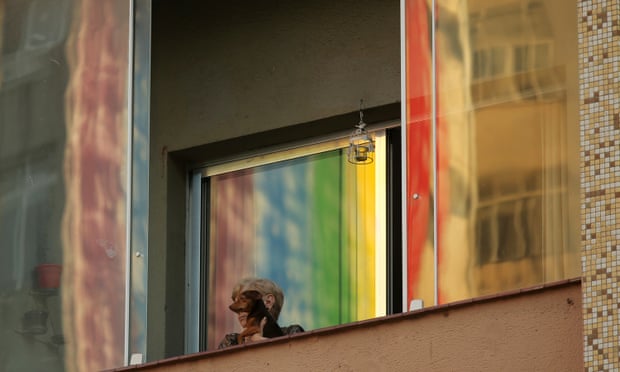‘Epidemic of violence’: Brazil shocked by ‘barbaric’ gang-rape of gay man
Activists fear that an increase in attacks on the country’s LBGT community is fuelled by a culture of homophobia at the very top.
An act of “barbaric” violence where a 22-year-old gay man was gang-raped and tortured has prompted fierce reaction in Brazil and is evidence of a growing tide of hate crime in the country, according to human rights campaigners.
The man, who has not been named, was attacked last week in Florianópolis by three armed men who used sharp objects during the assault and forced him to carve homophobic slurs into his legs, said activists.
His attackers left him in the street where he was found and taken to hospital. He is now recovering at home. Verdi Furlanetto, chief of police, confirmed to the Guardian that his force is investigating but there have been no arrests as yet.
“This is a frightening crime but it’s very common in Brazil, and violence – not only against lesbian, gay, bisexual and transgender people but also women, black people and immigrants – is worsening,” said Lirous Ávila, president of the Association in Defence of Human Rights, an organisation that helps victims of violence in Florianópolis.
Ávila is supporting the family of the victim, and added that news of the attack, which came to light during pride month, had provoked a huge nationwide reaction. She said opinion had been divided, with some people shocked by the case while others justified it, saying the man was gay. “It’s absurd to justify violence that is brutal and barbaric,” she said.
Brazil has one of the most alarming rates of violence and discrimination against LGBT people in the world. Cristian González Cabrera, a researcher at Human Rights Watch, said that while the supreme court banned violence and discrimination based on sexual orientation and gender identity in 2019, “the government needs to take urgent further steps to stave off this epidemic of violence against LGBT people”.
“Violence against LGBT people in Brazil has grown a lot recently,” said Margareth Hernandes, a lawyer based in Florianópolis and president of the gender law commission. “Brazil is the world champion of LGBT murders. We are a very conservative country where there is still a lot of prejudice. Hate speech ends up propagating violence.”
In 2020, 237 LGBT people died in situations of violence; there were 224 murders and 13 suicides, according to Grupo Gay da Bahia, the oldest LGBT rights organisation in Latin America. The national Human Rights Ombudsman’s Office reported to Human Rights Watch that, between January and June 2020, it received 1,134 complaints of violence, discrimination and other abuses against LGBT people. Data from the government’s hotline to report abuses, revealed that between 2011 and 2017, there were 12,477 complaints of violence against LGBT people in Brazil.
Hernandes, along with Ávila, attributes this rise in violence partly to the attitude of the leadership in Brazil. President Jair Bolsonaro has a long history of LGBT-phobic and misogynistic comments, including saying that he is a “proud homophobe”.
“This is a frightening crime but it’s very common in Brazil, and violence – not only against lesbian, gay, bisexual and transgender people but also women, black people and immigrants – is worsening,” said Lirous Ávila, president of the Association in Defence of Human Rights, an organisation that helps victims of violence in Florianópolis.
Ávila is supporting the family of the victim, and added that news of the attack, which came to light during pride month, had provoked a huge nationwide reaction. She said opinion had been divided, with some people shocked by the case while others justified it, saying the man was gay. “It’s absurd to justify violence that is brutal and barbaric,” she said.
Brazil has one of the most alarming rates of violence and discrimination against LGBT people in the world. Cristian González Cabrera, a researcher at Human Rights Watch, said that while the supreme court banned violence and discrimination based on sexual orientation and gender identity in 2019, “the government needs to take urgent further steps to stave off this epidemic of violence against LGBT people”.
“Violence against LGBT people in Brazil has grown a lot recently,” said Margareth Hernandes, a lawyer based in Florianópolis and president of the gender law commission. “Brazil is the world champion of LGBT murders. We are a very conservative country where there is still a lot of prejudice. Hate speech ends up propagating violence.”
In 2020, 237 LGBT people died in situations of violence; there were 224 murders and 13 suicides, according to Grupo Gay da Bahia, the oldest LGBT rights organisation in Latin America. The national Human Rights Ombudsman’s Office reported to Human Rights Watch that, between January and June 2020, it received 1,134 complaints of violence, discrimination and other abuses against LGBT people. Data from the government’s hotline to report abuses, revealed that between 2011 and 2017, there were 12,477 complaints of violence against LGBT people in Brazil.
Hernandes, along with Ávila, attributes this rise in violence partly to the attitude of the leadership in Brazil. President Jair Bolsonaro has a long history of LGBT-phobic and misogynistic comments, including saying that he is a “proud homophobe”.
Perpetrators of hate crimes often go unpunished, added Mott. “A serious problem in relation to homophobic and transphobic crimes is impunity,” he said. “The police – for reasons of homophobia or structural incapacity – don’t investigate every murder. This impunity brings about new crimes.”
Contact Samaritans for free from any telephone on 116 123. You can call even if you don’t have credit on your mobile, and the number won’t show up on phone bills. You can also email jo@samaritans.org or visit samaritans.org to find your nearest branch, where you can talk to a trained volunteer face to face.

